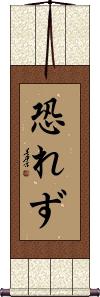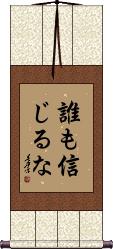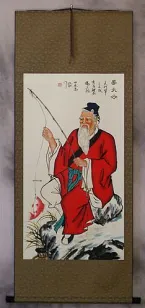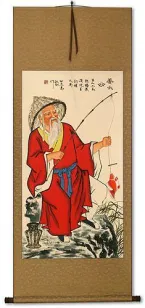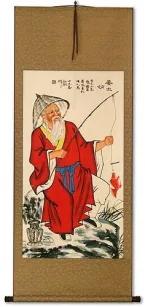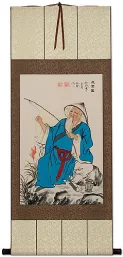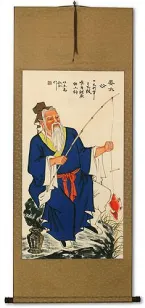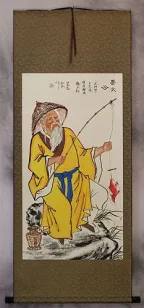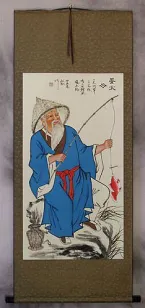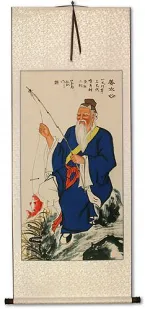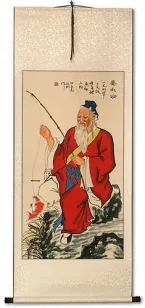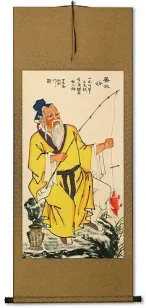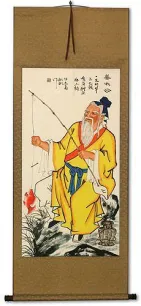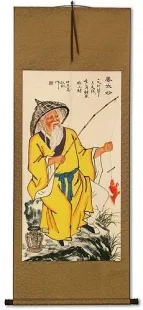Many custom options...
And formats...

The name Last Man in Chinese / Japanese...
Buy a Last Man calligraphy wall scroll here!
Personalize your custom “Last Man” project by clicking the button next to your favorite “Last Man” title below...
1. Eternal Love
2. Islam
3. No Fear
4. Undaunted After Repeated Setbacks
Eternal Love
永遠の愛 is a great way to write “Eternal Love” in Japanese.
The first two characters mean eternal, eternity, perpetuity, forever, immortality, and permanence.
The third character is a possessive article which sort of makes this selection mean “Love, of the eternal kind.”
The last character is “love.”
Cultural note: Most of the time, it is taboo to use the word “love” in Japanese. For instance, a Japanese man will say, “I like you,” rather than, “I love you,” to his spouse/girlfriend. However, this entry for eternal love is acceptable because of the way it is composed.
This entry is only appropriate if your audience is Japanese. We also have a Chinese version of this eternal love.
Islam
(phonetic version)
伊斯蘭教 both means and sounds like “Islam” in Mandarin Chinese.
The first three characters sound like the word “Islam,” and the last character means “religion” or “teaching.” It's the most general term for “Islam” in China. The highest concentration of Muslims in China is Xinjiang (the vast region in northwest China that was called The East Turkistan Republic until 1949 and is sometimes called Chinese Turkistan, Uyghuristan). Here you will find Uygurs, Kazakhs, Kyrgyz, and others that are descendants of Turkmen (possibly mixed with Persians and Arabs). Many of their ancestors were traders who traveled the silk road to buy and sell spices and silk and exchange other goods from the Orient and the Middle East.
I spent some time in Xinjiang and got to know this community. They are strong people who can endure much. They are friendly and love to have a good time. I was a stranger but was treated by villagers (near China's border with Afghanistan) as if I was a good friend.
However, I have heard that it's best not to cross them, as in this land, the law is the blade, and everything is “eye for an eye.” The Chinese government has little control in Xinjiang, with almost no police officers except in the capital of Urumqi (so it's a 60-hour roundtrip train ride to seek the aid of law enforcement in most cases).
While few seem devout, there are at least small mosques in every village. And you will never see a man or woman outside without a head covering.
It should be noted that these people are all citizens of China, but they are officially of the Caucasian race. A visit to Xinjiang will change your idea of what it means to be Chinese.
No Fear
恐れず is probably the best way to express “No Fear” in Japanese.
The first Kanji and the following Hiragana character create a word that means: to fear, to be afraid of, frightened, or terrified.
The last Hiragana character serves to modify and negate the first word (put it in negative form). Basically, they carry a meaning like “without” or “keeping away.” 恐れず is almost like the English modifier “-less.”
Altogether, you get something like “Without Fear” or “Fearless.”
Here's an example of using this in a sentence: 彼女かのじょは思い切ったことを恐れずにやる。
Translation: She is not scared of taking big risks.
Note: Because this selection contains some special Japanese Hiragana characters, it should be written by a Japanese calligrapher.
Undaunted After Repeated Setbacks
Persistence to overcome all challenges
百折不撓 is a Chinese proverb that means “Be undaunted in the face of repeated setbacks.”
More directly translated, it reads, “[Overcome] a hundred setbacks, without flinching.” 百折不撓 is of Chinese origin but is commonly used in Japanese and somewhat in Korean (same characters, different pronunciation).
This proverb comes from a long, and occasionally tragic story of a man that lived sometime around 25-220 AD. His name was Qiao Xuan, and he never stooped to flattery but remained an upright person at all times. He fought to expose the corruption of higher-level government officials at great risk to himself.
Then when he was at a higher level in the Imperial Court, bandits were regularly capturing hostages and demanding ransoms. But when his own son was captured, he was so focused on his duty to the Emperor and the common good that he sent a platoon of soldiers to raid the bandits' hideout, and stop them once and for all even at the risk of his own son's life. While all of the bandits were arrested in the raid, they killed Qiao Xuan's son at first sight of the raiding soldiers.
Near the end of his career, a new Emperor came to power, and Qiao Xuan reported to him that one of his ministers was bullying the people and extorting money from them. The new Emperor refused to listen to Qiao Xuan and even promoted the corrupt Minister. Qiao Xuan was so disgusted that in protest, he resigned from his post as minister (something almost never done) and left for his home village.
His tombstone reads “Bai Zhe Bu Nao” which is now a proverb used in Chinese culture to describe a person of strong will who puts up stubborn resistance against great odds.
My Chinese-English dictionary defines these 4 characters as “keep on fighting despite all setbacks,” “be undaunted by repeated setbacks,” and “be indomitable.”
Our translator says it can mean “never give up” in modern Chinese.
Although the first two characters are translated correctly as “repeated setbacks,” the literal meaning is “100 setbacks” or “a rope that breaks 100 times.” The last two characters can mean “do not yield” or “do not give up.”
Most Chinese, Japanese, and Korean people will not take this absolutely literal meaning but will instead understand it as the title suggests above. If you want a single big word definition, it would be indefatigability, indomitableness, persistence, or unyielding.
See Also: Tenacity | Fortitude | Strength | Perseverance | Persistence
Trust No One / Trust No Man
無法信任 is the kind of thing you expect to hear in a spy movie.
“Trust no one, 007!”
The first two characters express the idea of “no way” or “cannot.”
The last two characters mean “trust.”
The characters must go in this order due to Chinese grammar issues and in order to sound natural.
Note: This is not an ancient Chinese phrase by any means. It's just that we received a lot of requests for this phrase.
This is as close as you can get to the phrase “trust no man,” though technically, no gender is specified.
Trust No One / Trust No Man
誰も信じるな is as close as you can get to the phrase “trust no man” in Japanese, though no gender is specified.
The first two characters mean everyone or anyone but change to “no one” with the addition of a negative verb.
The third through fifth characters express the idea of believing in, placing trust in, confiding in, or having faith in.
The last character makes the sentence negative (without the last character, this would mean “trust everyone,” with that last character, it's “trust no one”).
Note: Because this selection contains some special Japanese Hiragana characters, it should be written by a Japanese calligrapher.
A Wise Man Changes His Mind (but a fool never will)
君子豹変す is a Japanese proverb that suggests that a wise man is willing to change his mind, but a fool will stubbornly never change his.
The first word is 君子 (kunshi), a man of virtue, a person of high rank, a wise man.
The second word is 豹変 (hyouhen), sudden change, complete change.
The last part, す (su), modifies the verb to a more humble form.
The “fool” part is merely implied or understood. So if wise and noble people are willing to change their minds, it automatically says that foolish people are unwilling to change.
This in-stock artwork might be what you are looking for, and ships right away...
Not the results for last man that you were looking for?
Below are some entries from our dictionary that may match your last man search...
| Characters If shown, 2nd row is Simp. Chinese |
Pronunciation Romanization |
Simple Dictionary Definition |
吃雞 吃鸡 see styles |
chī jī chi1 ji1 ch`ih chi chih chi |
(video games) PlayerUnknown's Battlegrounds (PUBG); battle royale game; last-man-standing game; to play PUBG (or similar game); to win at PUBG (or similar game) |
四相 see styles |
sì xiàng si4 xiang4 ssu hsiang shisou / shiso しそう |
(1) {Buddh} four essential elements of existence (birth, ageing, illness and death); (can act as adjective) (2) {math} four-phase; quadri-phase The four avasthā, or states of all phenomena, i. e. 生住異滅 birth, being, change (i. e. decay), and death; also 四有爲相. There are several groups, e. g. 果報四相 birth, age, disease, death. Also 藏識四相 of the Awakening of Faith referring to the initiation, continuation, change, and cessation of the ālaya-vijñāna. Also 我人四相 The ideas: (1) that there is an ego; (2) that man is different from other organisms; (3) that all the living are produced by the skandhas; (4) that life is limited to the organism. Also 智境四相 dealing differently with the four last headings 我; 人; 衆生; and 壽相. |
大将 see styles |
taishou(p); daishou(ok) / taisho(p); daisho(ok) たいしょう(P); だいしょう(ok) |
(1) {mil} general; admiral; (2) head; chief; leader; boss; kingpin; (3) (familiar language) (familiar or jocular term for addressing a male) old chap; mate; boss; chief; man; (4) (See 先鋒・せんぽう・2) athlete who competes in the last match of a team competition (kendo, judo, etc.); (given name) Hiromasa |
末人 see styles |
matsujin まつじん |
{phil} (ant: 超人・2) last man (Nietzsche's archetypal passive nihilist); (given name) Matsundo |
塞爾南 塞尔南 see styles |
sài ěr nán sai4 er3 nan2 sai erh nan |
Eugene Cernan (1934-), US astronaut in Apollo 10 and Apollo 17 missions, "last man on the moon" |
涅槃經 涅盘经 see styles |
niè pán jīng nie4 pan2 jing1 nieh p`an ching nieh pan ching Nehan gyō |
the Nirvana sutra: every living thing has Buddha nature. Nirvāṇa Sūtra. There are two versions, one the Hīnayāna, the other the Mahāyāna, both of which are translated into Chinese, in several versions, and there are numerous treatises on them. Hīnayāna: 佛般泥洹經 Mahaparinirvāṇa Sūtra, tr. by Po Fazu A.D. 290-306 of the Western Chin dynasty, B.N. 552. 大般涅槃經 tr. by Faxian, B.N. 118. 般泥洹經 translator unknown. These are different translations of the same work. In the Āgamas 阿含there is also a Hīnayāna Nirvāṇa Sūtra. Mahāyāna: 佛說方等般泥洹經 Caturdāraka-samādhi Sūtra, tr. by Dharmarakṣa of the Western Chin A.D. 265-316, B. N. 116. 大般泥洹經 Mahaparinirvāṇa Sūtra, tr. by Faxian, together with Buddhabhadra of the Eastern Chin, A.D. 317-420, B. N. 120, being a similar and incomplete translation of B. N. 113, 114. 四童子三昧經 Caturdāraka-samādhi Sūtra, tr. by Jñānagupta of the Sui dynasty, A. D. 589-618, B.N. 121. The above three differ, though they are the first part of the Nirvāṇa Sūtra of the Mahāyāna. The complete translation is 大般涅槃經 tr. by Dharmarakṣa A.D. 423, B.N. 113; v. a partial translation of fasc. 12 and 39 by Beal, in his Catena of Buddhist Scriptures, pp. 160-188. It is sometimes called 北本 or Northern Book, when compared with its revision, the Southern Book, i.e. 南方大般涅槃經 Mahaparinirvāṇa Sūtra, produced in Jianye, the modem Nanjing, by two Chinese monks, Huiyan and Huiguan, and a literary man, Xie Lingyun. B.N. 114. 大般涅槃經後分 The latter part of the Mahaparinirvāṇa Sūtra tr. by Jñānabhadra together with Huining and others of the Tang dynasty, B.N. 115, a continuation of the last chapter of B.N. 113 and 114. |
尤金·塞爾南 尤金·塞尔南 see styles |
yóu jīn · sài ěr nán you2 jin1 · sai4 er3 nan2 yu chin · sai erh nan |
Eugene Cernan (1934-), US astronaut in Apollo 10 and Apollo 17 missions, "last man on the moon" |
山中無老虎,猴子稱大王 山中无老虎,猴子称大王 see styles |
shān zhōng wú lǎo hǔ , hóu zi chēng dà wáng shan1 zhong1 wu2 lao3 hu3 , hou2 zi5 cheng1 da4 wang2 shan chung wu lao hu , hou tzu ch`eng ta wang shan chung wu lao hu , hou tzu cheng ta wang |
in the country of the blind the one-eyed man is king (idiom); (depending on the source, the last word is either 大王[da4 wang2] or 大王[dai4 wang5]) |
Variations: |
amarimononifukugaaru / amarimononifukugaru あまりものにふくがある |
(exp,v5r-i) (proverb) don't despair because you're the last to take your pick; you can find treasures in leftovers; one man's trash is another's treasure |
Variations: |
hitorinokorazu ひとりのこらず |
(expression) every one (of them); (one and) all; without exception; to a man; to the last person |
The following table may be helpful for those studying Chinese or Japanese...
| Title | Characters | Romaji (Romanized Japanese) | Various forms of Romanized Chinese | |
| Eternal Love | 永遠の愛 | ei en no ai eiennoai | ||
| Islam | 伊斯蘭教 伊斯兰教 | yī sī lán jiào yi1 si1 lan2 jiao4 yi si lan jiao yisilanjiao | i ssu lan chiao issulanchiao |
|
| No Fear | 恐れず | oso re zu / osorezu | ||
| Undaunted After Repeated Setbacks | 百折不撓 百折不挠 | hyaku setsu su tou hyakusetsusutou hyaku setsu su to | bǎi zhé bù náo bai3 zhe2 bu4 nao2 bai zhe bu nao baizhebunao | pai che pu nao paichepunao |
| Trust No One Trust No Man | 無法信任 无法信任 | wú fǎ xìn rèn wu2 fa3 xin4 ren4 wu fa xin ren wufaxinren | wu fa hsin jen wufahsinjen |
|
| Trust No One Trust No Man | 誰も信じるな | dare mo shin ji ru na daremoshinjiruna | ||
| A Wise Man Changes His Mind (but a fool never will) | 君子豹変す | kun shi hyou hen su kunshihyouhensu kun shi hyo hen su | ||
| In some entries above you will see that characters have different versions above and below a line. In these cases, the characters above the line are Traditional Chinese, while the ones below are Simplified Chinese. | ||||
Successful Chinese Character and Japanese Kanji calligraphy searches within the last few hours...


